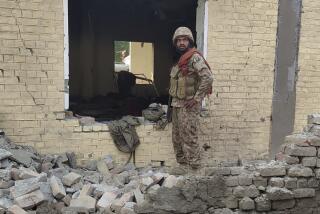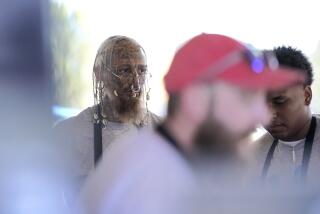Endangered Iraqi Police Weigh Careers
- Share via
KIRKUK, Iraq — As his mother sat by his side in the hospital, crying and wiping the bloodstains on his uniform, Abass Jasim explained that he would like to leave the police force after a suicide blast here Monday. But he was not sure he could.
“This may be the only way to earn my living,” said Jasim, 20, who suffered what doctors said are life-threatening injuries. “I want to leave, but I am not sure I can. I may have to die as a police officer.”
After this northern city was rocked by a suicide car bomb that killed at least nine police officers and injured 40 other Iraqis, most of them also police, an increasingly familiar ritual began. In a nearby hospital, weeping families gathered, some officers died from their wounds, and many surviving victims pledged they would return to the force.
Medical personnel said 18 officers were critically injured in the blast, and the death toll is expected to rise.
The determination of Iraqi police to serve in the face of such attacks has been cited by U.S. officials as proof that the insurgency is not undermining this nation’s morale. That resolve is important, says the military, because Iraqi forces will provide security when American troops withdraw.
But as reactions to Monday’s attack demonstrated, police officers’ dedication to their jobs is a more confusing jumble of emotions than simple patriotism, and not all their motivations are supportive of a united Iraq. Particularly in Kurdish-dominated northern Iraq, the semiautonomous area known as Kurdistan, loyalties are mixed.
“I will continue to be a policeman to help the Kurds,” 33-year-old Syrwan Azidium said from a hospital bed, burns covering his face and arms. “But not for Iraq. Only for Kurdistan.”
Witnesses said a white Oldsmobile rushed to the gates of the Rahimawa police station about 8 a.m. and exploded as 400 officers changed shifts.
The blast, which immediately killed seven officers, occurred less than a month after two suicide explosions in nearby Irbil killed more than 100 people and less than two weeks after explosions in and around Baghdad killed more than 75 Iraqis who were applying to join the police and military forces.
The latest attack coincided with an Iraq visit by Secretary of Defense Donald H. Rumsfeld to discuss security issues with commanders. Elsewhere in Iraq, 17 U.S. soldiers were suspended pending an inquiry into allegations that they abused Iraqi prisoners, according to a spokesman for the U.S.-led occupation authority.
The Kirkuk attack was part of a pattern of violence in which at least 230 Iraqis and 19 coalition soldiers have died in the country during the last month, according to media reports.
Authorities in Kirkuk said they were just beginning an investigation and have no information regarding the identity of the suicide bomber.
The deputy chief of police, Maj. Gen. Torhan Abdel Rahman, said he suspected that foreign fighters were responsible for the attack, but added that police had not seen nor arrested any non-Iraqis in Kirkuk in the last two months. Police, however, did arrest 11 people with ties to Saddam Hussein’s government this month, Rahman said.
Many police officers injured in Kirkuk said they intended to return to the force; some are motivated by simple patriotism.
“I will always be a policeman,” said Saman Mohammed, 27, who sustained extensive shrapnel wounds as the blast caught him on the way to his car. “I want to bring justice to Iraq.”
Others, however, plan to go back to the force because they lack any other option.
“I would like to leave,” Safid Addin said. “But there are no other jobs. I must feed my family.”
Some families of the wounded voiced hope that officers would end their police careers. “I don’t care if he does not work,” said Noria Khadem Hassein, the mother of Abass Jasim.
“If I had lost my son, no money can repay that. What’s the use of money when it is not even safe to earn it?”
More to Read
Sign up for Essential California
The most important California stories and recommendations in your inbox every morning.
You may occasionally receive promotional content from the Los Angeles Times.













